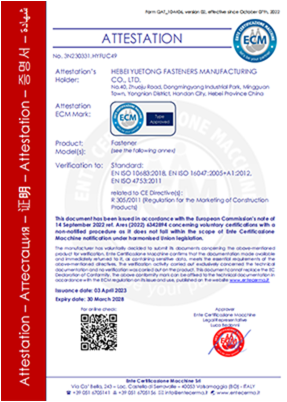Okt . 31, 2024 04:24 Back to list
flat washer m20
Understanding Flat Washers The M20 Size
Flat washers are essential components in various mechanical and construction applications. These simple, disc-shaped devices are designed to distribute the load of a threaded fastener, such as a bolt or nut, over a larger area. This load distribution reduces the risk of damaging the materials being fastened and helps ensure a secure connection. One commonly used size of flat washer is the M20 washer, which is tailored specifically for use with M20 bolts.
What is an M20 Flat Washer?
The term M20 refers to the metric dimension of the washer and the bolt that it corresponds with. M indicates that it is a metric size, while 20 signifies that the nominal diameter of the bolt is 20 mm. M20 flat washers are typically larger than washers for smaller bolt sizes, providing ample surface area to prevent damage to the workpiece while ensuring a stable connection.
M20 washers usually have an inner diameter that accommodates the M20 bolt perfectly. The outer diameter, thickness, and material of the washer can vary based on the application requirements. Common materials for M20 flat washers include stainless steel, carbon steel, and sometimes specialized materials like nylon or brass, depending on the environment and load requirements.
Importance of Using M20 Flat Washers
Using flat washers is crucial for several reasons
1. Load Distribution When an M20 bolt is tightened, it can create significant stress on the material it is fastening. The M20 flat washer helps to distribute this load evenly, which can prevent cracking or deformation of the material.
flat washer m20

2. Surface Protection Applying a flat washer between the fastener and the workpiece helps to protect the surface of the materials being joined. Without a washer, there is a higher likelihood of surface damage over time, especially when the connection is subjected to vibration or movement.
3. Prevention of Fastener Loosening Flat washers can help in maintaining the tension in bolted joints. Over time, as materials settle or experience thermal expansion and contraction, the load on the bolt can reduce, potentially leading to loosening. Using a washer keeps the load constant and reduces the chance of loosening due to vibration.
4. Corrosion Resistance In environments that are prone to corrosion, using the right material for flat washers can enhance the durability of the joint. Stainless steel M20 flat washers, for example, provide resistance to rust and degradation, contributing to a longer service life for the assembly.
Installation Tips
When installing an M20 flat washer, it's essential to ensure proper alignment. The washer should be placed under the nut or bolt head, ensuring that it sits flat against the surface of the material. This alignment helps in achieving optimal load distribution. Additionally, checking the torque specifications is crucial, as overtightening can lead to material deformation, while undertightening may not provide a secure bond.
Conclusion
M20 flat washers play a vital role in ensuring the integrity and longevity of bolted connections. Their ability to distribute load, protect surfaces, and maintain tension makes them an indispensable component in both mechanical and construction industries. Selecting the appropriate size and material for flat washers is critical to achieving optimal results in any fastening application. As we continue to use these essential components, understanding their functions and benefits can lead to more reliable and safe constructions.


